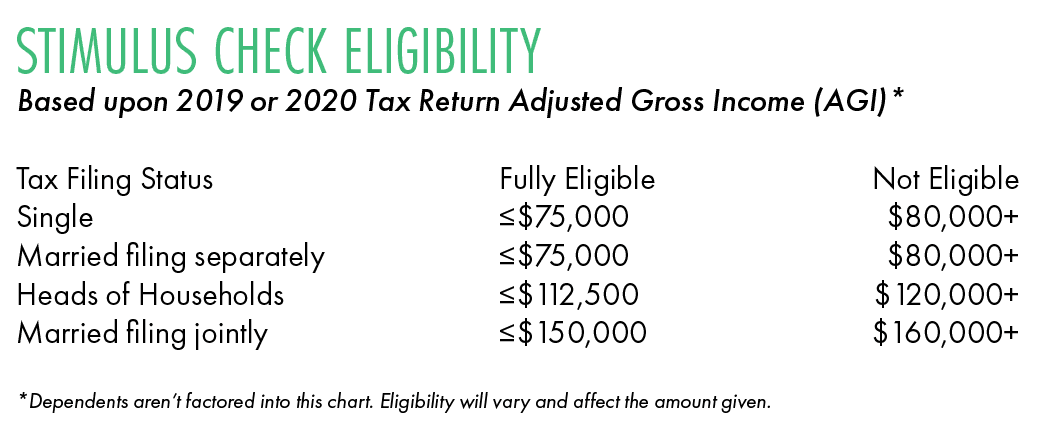As Americans have continued to get through the pandemic, the American Rescue Plan Act of 2021 brings a third round of economic stimulus checks along with $1.9 trillion in COVID relief to the economy.
Checks are expected to start coming within days of Biden signing the bill, which President Joe Biden signed into law on Thursday, March 11. It’s a massive piece of legislation that includes individual tax relief, unemployment assistance, aid to states and municipalities, nutrition assistance, housing aid, optional paid sick and family leave, money for education and childcare, health insurance subsidies, more money for small businesses, additional vaccines and testing and rural hospital assistance.
STIMULUS CHECKS
The third round of economic stimulus checks provide direct payments worth up to $1,400 per eligible person. A married couple with three children, for example, could receive up to $7,000. These payments serve as an advance receipt of a 2021 income tax credit known as recovery rebates.
Stimulus checks are based on your 2020 federal tax return, if already filed. If not, the Internal Revenue Service (IRS) will refer to your 2019 return.
A full tax-free $1,400 will go to single persons with an average gross income (AGI) up to $75,000 and $2,800 to married couples with an AGI up to $150,000, plus an additional $1,400 per eligible dependent. If your AGI exceeds that amount, your check will be smaller. If your AGI exceeds it by only $5,000-10,000 more than that, you won’t get anything.

Although similar to the payments previously distributed in 2020 via the CARES Act and Consolidated Appropriations Act, the 2021 Recovery Rebates expand eligibility to include all dependents, rather than just children under the age of 17. This expanded eligibility is balanced by much sharper phaseout limitations than in the previous two rounds.
EXAMPLE:
If you are married and filing jointly, your joint household Adjusted Gross Income (AGI) is $145,000 and you have three kids – age 5, 10 and 17 – you would likely receive a stimulus check for $7,000 ($1,400 x 5).
If you don’t qualify for the stimulus check based off your 2020 income but would qualify based off your 2021 income, you can claim a recovery rebate credit on your 2021 income tax return. If your income is near the eligibility cut off, you may want to consider any tax planning opportunities to reduce your income in 2021.
MUCH LARGER CHILD TAX CREDITS
The $2,000 Child Tax Credit (CTC) increases dramatically, just for this year. The credit is upped to $3,600 per child under age six and $3,000 per child above age six and under 18 (up one year from the previous under age 17 restriction).
The law creates a new program for the advance payment of the child tax credit. It directs for 50% of the expected tax credit to be paid out in equal installments during the tax year, with the remainder claimed on the tax return as in the past.
Phaseout limits for the Child Tax Credit hold closely to those for the Recovery Rebates. The enhanced portion of the credit will be fully available for single filers with annual incomes up to $75,000 and joint filers earning up to $150,000. It begins to phase out incrementally after those income thresholds. The $2,000 part of the child tax credit still begins to be phased out at an income of $200,000 for single filers and $400,000 for married couples filing jointly.
EXAMPLE:
That same family from the previous example (married and filing jointly with a joint household AGI of $145,000 and three kids – age 5, 10 and 17) would qualify for the enhanced CTC, which could add up to $9,600 ($3,600 for the first child under age 6, plus $3,000/child for those age 10 and 17). If that family’s AGI exceeded $160,000, they would no longer be eligible for the recovery rebate credit/stimulus check and their enhanced CTC would be incrementally phased out for the income above $150,000.
To date, this beefed-up child tax credit will apply only in the 2021 tax year. According to Kiplinger’s report, “Odds of the Expanded Child Tax Credit Becoming Permanent,” on March 11, 2021, some Congressional Democrats would like to see the credits remain in place long-term to help reduce child poverty in the United States.
SMALL BUSINESS SUPPORT
More than $50 billion will be distributed to small businesses, including $7 billion for the Paycheck Protection Program (PPP) and $15 billion to the Economic Injury Disaster Loan (EIDL) program, which provides long-term, low-interest loans from the Small Business Administration. The bill also provides $25 billion for relief for small and mid-sized restaurants.
MORE RELIEF FOR THE UNEMPLOYED
Ensuring people can afford to maintain their health insurance has been made a priority. People involuntarily terminated from employment may maintain their existing health insurance via COBRA from April through September 2021 at no cost. Premiums for this coverage will be paid by the taxpayer’s former employer, which can be reimbursed with a refundable payroll tax credit.
The Federal subsidies for unemployment benefits for the long-term unemployed and self-employed individuals have been extended through September 6, 2021. The $300 weekly enhanced benefit is also extended through September 6, 2021.
The first $10,200 of unemployment benefit payments received in 2020 will be tax-free for households with annual income less than $150,000. For those that file married filing jointly, each spouse may receive up to $10,200 of unemployment compensation tax free. If you have already filed your 2020 tax return, you may need to file an amended return to take advantage of this law change.
Update: As of March 17, the IRS has stated that those who received unemployment benefits in 2020 and have already filed their 2020 tax returns should not file an amended return at this time, until the IRS issues additional guidance.
© 2021 Moneta Group Investment Advisors, LLC. All rights reserved. Moneta Group Investment Advisors, LLC is an SEC registered investment advisor and wholly owned subsidiary of Moneta Group, LLC. Registration as an investment advisor does not imply a certain level of skill or training. Moneta is a service mark owned by Moneta Group, LLC. These materials were prepared for informational purposes only based on materials deemed reliable, but the accuracy of which has not been verified. Given the dynamic nature of the subject matter and the environment in which these materials were prepared, they are subject to change as additional legislation and government analysis come forth. This is not an offer to sell or buy securities, nor does it represent any specific recommendation. You should consult with an appropriately credentialed professional before making any financial, investment, tax or legal decision. These materials do not take into consideration your personal circumstances, financial or otherwise.



